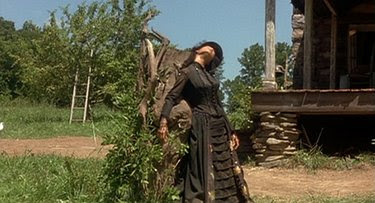 This is my third installment in a series about films that owe far more to the horror genre than you'd ever imagine, and I finally worked up the energy to tackle one of my favorite films of all time, a 1977 Robert Altman picture that somehow managed to capture two hot actresses who would both become horror icons: Sissy Spacek fresh off the set of Carrie, and a willowy Shelley Duvall just before she landed a lead role in Kubrick's The Shining. Oddly, thematic elements of both movies persist throughout this one.
This is my third installment in a series about films that owe far more to the horror genre than you'd ever imagine, and I finally worked up the energy to tackle one of my favorite films of all time, a 1977 Robert Altman picture that somehow managed to capture two hot actresses who would both become horror icons: Sissy Spacek fresh off the set of Carrie, and a willowy Shelley Duvall just before she landed a lead role in Kubrick's The Shining. Oddly, thematic elements of both movies persist throughout this one.
If that was all 3 Women had to offer horror fans, it would still be plenty. It's just the beginning, however! As petty weirdnesses begin to pile up (and identities begin to unravel) Spacek and Duvall wage a primordial battle for dominance that threatens to capsize reality itself -- think Single White Female meets Mulholland Drive. Supposedly based on Altman's dreams, 3 Women (obligatory Netflix link) was filmed in sequence with little or no script; it's a mind-shreddingly compulsive movie-watching experience that leaches into your brainstem and camps out there for weeks afterward. Care for a glimpse?

Millie Lammoreaux is perfect. She loves irises. She loves flowers, and candlelight. She knows surefire ways to win a man in one night, and every other valuable nugget you can pick out of McCall's and the Neiman Marcus catalog. Her car isn't just mustard yellow, it's French mustard -- and she has the best parking spot at her swinging singles apartment complex, which unfortunately is somewhere in the desolate, not-so-swinging California desert. Even so, everything she says and does is infused with that special Millie Lammoreax sparkle, announcing her unique presence to the world. Hello, World! Despite her confidence and tenacity, however, there is no one on Earth who's as universally ignored and unloved as Millie Lammoreaux. Her unconscious awareness of this writhes just below the surface -- with every step she teeters on the edge of a howling abyss of total irrelevance and meaninglessness.
No one needs to come out and actually say all of this; Altman manages to sum up his awkward heroine's cosmic undone-ness for us in an ingeniously malicious visual gag that recurs throughout the entire film:




Duvall was apparently instrumental in the devising of her character, deciding with relish which topics Millie would prattle on about while everyone does their damned best to pretend she doesn't exist. Far from distracting from the performance, the fact that we know the actress is in on the joke only salts the wound -- it's as if Duvall has tapped into some cosmic vital essence of pure tragedy and administers it to us via a sugared time-release capsule. In fact, she invokes a figure so epically tragic that it baffles the brain's urge -- need, even -- to see the seams in her performance; you just can't invent pathetic that pathetic, it insists.

Anyhow, Millie's in a jam now that her roommate has left her in the lurch, but the only person who answers her ad is Pinky Rose (Spacek), the drab new girl at work who looks and acts like she just fell off the back of a covered wagon, or maybe a UFO. She's Millie's cosmic opposite -- she never says or does anything right, and seems almost sociopathically unselfconscious. Perhaps most damning of all, she absolutely adores Millie on sight, and wants to be just like her. A lot of the movie's delightful awkwardness stems from Millie gratefully lapping up Pinky's praise (perhaps the only attention anyone's ever paid her), then grimacing as she faces reminders that this odd girl's proximity will surely comment poorly on Millie's own ability to win friends and influence people.

Okay, I won't lie -- I threw this photo in just so you could marvel at Millie's huge white panties, shining flatteringly through her sexy yellow negligee even at twenty paces.
Anyhow, the third of the titular women is Willie, the owner of the Purple Sage Apartments and the local bar (Millie's "hangout"). Willie spends most of her minimal screen-time painting murals in stony, wild-eyed silence and being fantastically pregnant. Just about every surface she comes into contact with becomes plastered with barbaric sci-fi demon people, which are summarily ignored by all. I mean, it was the '70s, after all -- I'm sure this shit was everywhere back then.

Gleefully moving into Millie's blindingly yellow apartment at the Purple Sage, Pinky soon turns out to be not only the kind of mousy little sneak who will read your locked diary, but the kind who will read it out loud. (You may also want to keep an eye on your Social Security card, your car keys, and your bathrobe.)

In case you haven't picked up on it so far, the '70s camp value here registers through the roof. Again, though -- this is actually very carefully crafted crypto-camp, honed to a knife's edge. You'll cringe and laugh when Millie (who is "famous for her dinner parties") returns from the grocery store with wine ("Tickle Pink" and "Lemon Satin"), pigs-in-a-blanket, Sociables with Cheez-Wiz, and canned chocolate pudding that she tops with off-brand spray whip, but Altman cherishes these details so lovingly that instead of laughing from a distance, the viewer is drawn deeper into the mind of the movie. What can it all mean?


Similarly, in nearly any other movie Pinky's mishap with the cocktail sauce would be ham-handed foreshadowing of the worst kind, but since practically every sentence or camera angle in 3 Women hints at some conspiracy or impending unimaginable doom (like when Pinky meets "Dirty Gertie," a necrotic doll that spits on her and then howls with animatronic laughter), details like a gruesome-looking dress stain wind up playing as startlingly benign, just one more gap in a ragged puzzle with no edge-pieces.

So what do we have? One hopeless nobody who, despite her tireless effort, is so utterly irrelevant that she could totally vanish without anyone noticing, and another hopeless nobody who covets the tiny niche that the other has dug out in the world. Millie and Pinky are like twins in utero -- they each crave the constant presence of an Other... but they also both want to be Millie. Even Millie's name, Lammoreaux, points to this paradox; it's French for "The Lovers," a sly reference to the Tarot card often claimed to be associated with Gemini, or "the twins." Will one "twin" consume the other? Will either survive?

The answer to each of those questions: "...Yes and no."

Following what can only be described as a sort of miscarriage, Pinky rebirths herself as the new Millie; it's merely a minor annoyance to her that the old Millie is still dithering about on the sidelines. Of course it's a far greater problem for Duvall's character, who must finally confront that her existence no longer matters to a single living soul. She's now completely subservient to Millie: The Sequel (whose ascension has resulted in a very Carrie makeover and more male attention than her predecessor ever dreamed of).


The final act of this movie takes all of these elements blends them into a horrible hallucinogenic smoothie of primal despair. There may or may not be a murder. There may or may not be a complete schizoid break. The three women may or may become a perfect familial unit. It's hard to say -- words become useless as bleak moments disappear into each other like Russian nesting dolls.



Can we even call this an ending? As the final scene quietly dribbles away, it becomes tempting to dismiss the whole mess as a bunch of meaningless events happening to meaningless people. This, however, is the very nature of the film's Great Work -- its characters' desperate search for meaning and justification in a cruel void; the blind, animal viciousness of the unconscious mind, as it either perceives a usurper or strives to usurp. And of course, the only way to be sure of what you've seen is to consent to going back for seconds, watching in amusement and amazement and wondering, "How in the world did this happen?"
One of the best ways to resolve this question is to avoid asking it. As much as I crave opportunities to watch or discuss 3 Women, perhaps you really shouldn't watch it at all... ever. The fact that Altman and his gals playfully and knowingly lobbed this malignant thing into our world knowing doesn't require you to risk contact with sticky cultural thought-viruses by actually returning the serve -- feel free to let this one sail by and land out of bounds. It's too late for me, however; you can tell from reading this how far gone my condition is, and I assure you it's quite contagious. If you're wise, you'll back away slowly and forget what you've read -- if you must indulge, however, be sure to quarantine yourself for a significant time afterward, lest your friends never forgive you for contaminating them. Eventually, this movie will make beasts, infants, and invalids of us all.
Summary only...
 If you're like me, you chase away holiday blues by watching movies showcasing those drastically less fortunate than yourself. I've spent many years getting myself fully freaked out/bummed out with the movie that rescued Sally Field's career from the Flying Nun quagmire, the 1976 television movie Sybil (obligatory Netflix link), based on a real-life victim of unspeakable parental sexual abuse whose psyche shattered into 16 distinguishable personalities. The acting is stellar, the story is sickening and heartbreaking, and overall the movie has that gritty 1970's New York City slice-of-life thing going for it, a factor which was totally lost on me back when I first used the family VCR to tape this off of Channel 45 back in 1993. All said, the film holds up miraculously well.
If you're like me, you chase away holiday blues by watching movies showcasing those drastically less fortunate than yourself. I've spent many years getting myself fully freaked out/bummed out with the movie that rescued Sally Field's career from the Flying Nun quagmire, the 1976 television movie Sybil (obligatory Netflix link), based on a real-life victim of unspeakable parental sexual abuse whose psyche shattered into 16 distinguishable personalities. The acting is stellar, the story is sickening and heartbreaking, and overall the movie has that gritty 1970's New York City slice-of-life thing going for it, a factor which was totally lost on me back when I first used the family VCR to tape this off of Channel 45 back in 1993. All said, the film holds up miraculously well.
















































